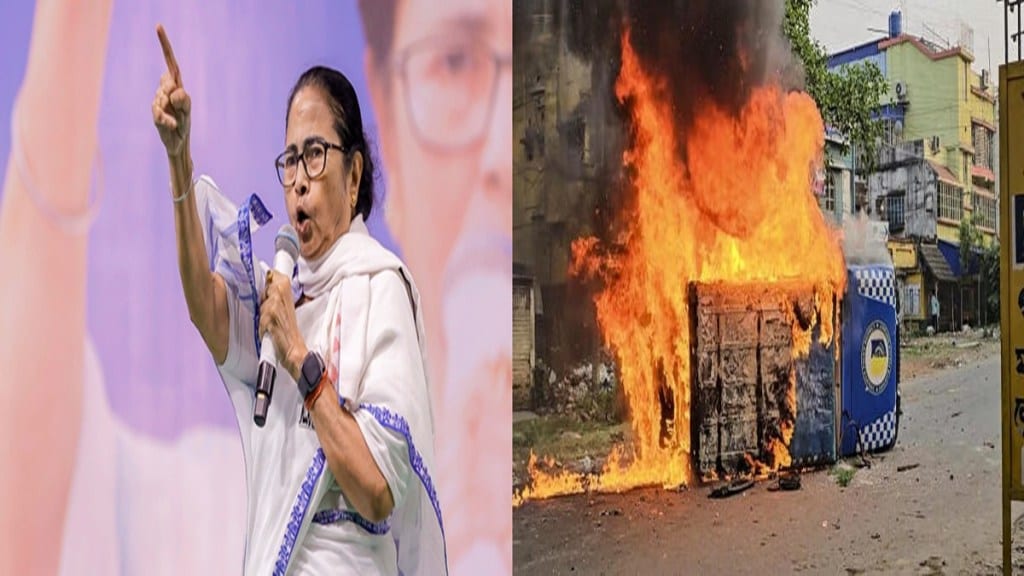Three people were killed and others injured on Saturday as violent protests against the Waqf Act rocked Murshidabad district in West Bengal. The BJP has since accused Chief Minister Mamata Banerjee of inciting ‘anti-Hindu violence in the name of protests’ and claimed that the police had become a “mute spectator”. Meanwhile the CM insisted that the law would not be implemented in Bengal and urged people to remain calm.
Two of the victims, a father-son duo, were killed at their residence in Jafrabad in Samserganj. An IPS officer told PTI that both bodies had multiple stab wounds on them, signaling a ruthless attack. Their family alleged that miscreants looted their house and stabbed the two before leaving. The third death was reported from Dhulian, also in Samserganj, where a male victim died of gunshot injuries.
The protests had turned violent in several areas, leading to confrontations between law enforcers and protesters. Some security personnel were injured following attacks by protestors, leading to police retaliation in the form of tear gas shelling and baton charges to scatter crowds. Officials have since arrested 118 people in connection with the violent agitation.
According to details shared by Indian Express, the police had to fire four rounds to control the mob, leaving two people injured. Fifteen police personnel also received injuries while trying to control the mob on Friday.
There was widespread destruction throughout sections of Murshidabad, with police cars torched, railway tracks obstructed, and public and private properties destroyed in areas such as Stuti and Samserganj.
As a reaction to the increasing unrest, more troops from the Railway Police Force and Border Security Force were sent to reinstate order. Violent attacks were also seen in other districts, such as Malda, South 24 Parganas, and Hooghly.
The authorities are keeping a close watch on the situation, with the security heightened in the sensitive areas.
Mamata Banerjee reiterates opposition to the law
Chief Minister Mamata Banerjee, meanwhile, reaffirmed her government’s firm stance against the Waqf Amendment Bill. In a series of posts on X, she stated, “We have made our position clear … we do not support this law. It will not be implemented in our state.”
সবার কাছে আবেদন
— Mamata Banerjee (@MamataOfficial) April 12, 2025
সব ধর্মের সকল মানুষের কাছে আমার একান্ত আবেদন, আপনারা দয়া করে শান্ত থাকুন, সংযত থাকুন। ধর্মের নামে কোনো অ-ধার্মিক আচরণ করবেন না। প্রত্যেক মানুষের প্রাণই মূল্যবান, রাজনীতির স্বার্থে দাঙ্গা লাগাবেন না। দাঙ্গা যারা করছেন তারা সমাজের ক্ষতি করছেন।
মনে রাখবেন, যে…
Calling for peace, Banerjee urged, “People of all religions please remain calm… Do not engage in irreligious behaviour in the name of religion. Every human life is precious; do not incite riots for politics.”
Addressing the political allegations against her, she added, “Remember, we did not make the law that many are agitated against. The law was made by the central government. So the answer you want should be sought from the central government.”
Banerjee also warned of legal consequences for those inciting violence: “We will take legal action against those who incite riots. We do not condone any violent activity. Some political parties are trying to misuse religion for political gain. Do not give in to their persuasion. I think religion means humanity, goodwill, civilization and harmony.”
Political blame game erupts
The unrest has triggered a sharp political confrontation between the BJP and the TMC.
BJP’s Amit Malviya accused West Bengal Chief Minister Mamata Banerjee of inciting the violence, saying she “was the first to stoke widespread discontent against the Waqf amendments” and that she “actively instigated and sponsored violence, particularly after Friday prayers.” He added, “The truth is… no state government has the authority to block a law passed by the Indian Parliament. Mamata Banerjee has no choice but to comply. She bears full responsibility for the communal violence and the tragic loss of life that has followed.”
Mamata Banerjee is a liar. She was the first to stoke widespread discontent over the Waqf Amendment—even while the JPC and Parliament were still discussing provisions to curb misuse and add safeguards to the new law.
— Amit Malviya (@amitmalviya) April 12, 2025
She has actively instigated and sponsored violence,… https://t.co/Bw7B7clgWu pic.twitter.com/yDLfzzjCcD
Another BJP leader, Sukanta Majumdar, echoed the criticism, writing on X, “Violent anti-Waqf protests have brought the state to a standstill. In Murshidabad, several express trains are being blocked, passengers are stranded, terrified, and rail premises have turned into war zones.” He also released a list of train services disrupted due to the violence.
Mamata Banerjee has completely failed to maintain law and order in West Bengal. Violent anti-Waqf protests have brought the state to a standstill. In Murshidabad, several express trains are being blocked, passengers are stranded, terrified, and rail premises have turned into war…
— Dr. Sukanta Majumdar (@DrSukantaBJP) April 11, 2025
Police respond: ‘minimum force was used’
Speaking to reporters, Jawed Shamim, Additional Director General of Police (Law and Order), claimed that the state police were not responsible for the firing and suggested an investigation would determine if the BSF was involved. “We are not trigger-happy,” he said. “Minimum force” was used to disperse the mob, and 118 arrests have been made so far.
“We will take strong action against people indulging in hooliganism and rumour-mongering,” he added. “People have to realise reality… our force is on the ground. This rumour-mongering has to stop.”
West Bengal Director General of Police Rajeev Kumar also addressed the media, acknowledging the tense situation in Jangipur: “An atmosphere of unrest has been seen in Jangipur since yesterday and communal disturbance has also been observed. Any kind of hooliganism will not be tolerated. We are dealing with the situation very strongly. It is our responsibility to protect human life.”
Authorities have imposed restrictions on large gatherings in certain districts as tensions remain high. Security forces continue to monitor the affected regions, while appeals for peace are being echoed across political and administrative lines.
With input from agencies.


